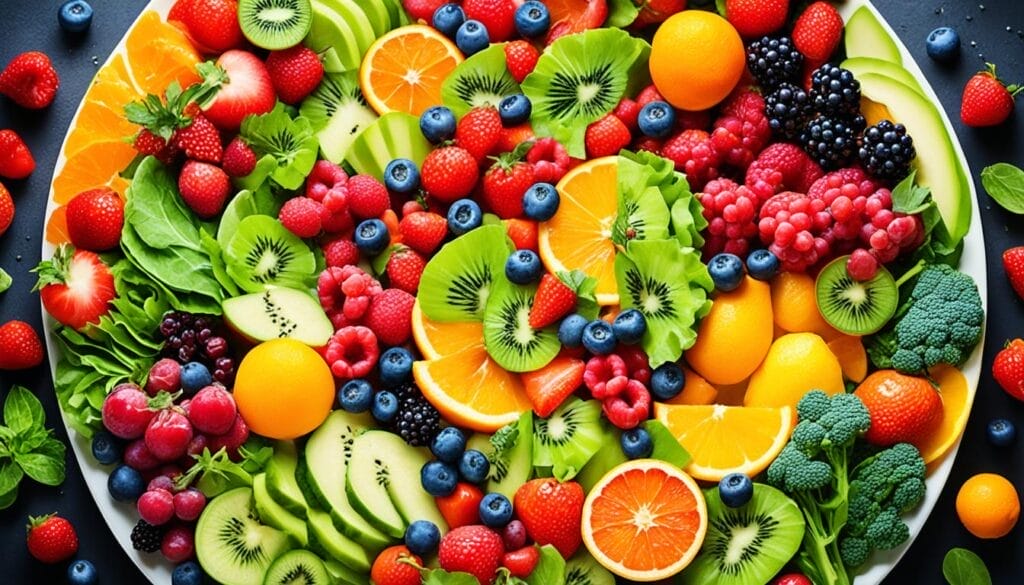Have you struggled with weight loss too? I know I have. Until, I found the answer in a vegetarian weight loss diet. You see, I was trying everything to lose weight.
Tried many diets, hit the gym hard, and even crash-dieted. It all left me feeling empty. And still, those pounds stayed stubborn.
Then I tried going vegetarian. Quitting meat wasn’t easy, as I loved it. But I felt it was the right step for my health. This choice changed everything for me.
I found joy in eating plant-based foods. Fruits, veggies, grains, and more became my go-to. These foods were tasty, filling, and energising.
I started to shed weight and felt really good. It was like I found the key to real, lasting health. And I liked what I was eating.
Getting healthy doesn’t have to be hard. It can actually be fun and fulfilling. This has been my experience with vegetarianism. Maybe it can help you too.
Key Takeaways
- Embracing a vegetarian diet can be a game-changer for weight loss.
- Plant-based foods like fruits, vegetables, whole grains, legumes, nuts, and seeds are the foundation of a vegetarian diet.
- Vegetarianism not only helps with weight loss but also boosts energy levels and overall well-being.
- Healthy eating doesn’t have to be restrictive or boring; it can be a joyful and fulfilling experience.
- If you’re tired of struggling with weight loss, consider giving vegetarianism a try – it might just be the missing piece to your puzzle.
What is a Vegetarian Diet?
A vegetarian weight loss diet means not eating meat, fish, or poultry. There are several types of vegetarian diets. These include lacto-ovo-vegetarian, lacto-vegetarian, ovo-vegetarian, and vegan. They all mainly eat fruits, vegetables, whole grains, legumes, nuts, and seeds.
A vegetarian diet is full of fibre, micronutrients, and plant compounds. It has fewer calories, less fat, and protein than meat-based diets.
Studies show that vegetarian diets can help lower the risk of certain diseases. This includes heart disease, some cancers, diabetes, and high blood pressure. By eating mostly plants, vegetarians get many nutrients that keep them healthy.
The Health Benefits of Vegetarianism
- Reduced risk of heart disease
- Lower risk of certain cancers
- Decreased likelihood of developing diabetes
- Improved blood pressure management
Choosing a vegetarian diet can make you healthier. It reduces the risk of getting some diseases and helps you manage your weight.
Barriers to Losing Weight on a Vegetarian Diet
Being on a vegetarian weight loss diet can help with losing weight quickly. But there are some challenges to keep in mind to make the journey smoother. It’s about knowing and tackling these issues head-on.
1. Protein Intake
Not getting enough protein can be a hurdle for weight loss on a vegetarian diet. Protein is vital for keeping your muscles strong, making you feel full, and helping you lose weight. Make sure you eat various plant-based proteins like beans, tofu, and quinoa each day. These not only offer protein but also have lots of fibre, which is good for controlling your hunger and managing your weight.
2. Refined Carbs
Eating too many refined carbohydrates can slow down your weight loss. White bread, pasta, cakes, and sweet snacks are full of refined carbs. They cause quick rises in your blood sugar and increase cravings. Choosing whole grain versions like brown rice and oats gives you more fibre and nutrients. This makes you feel full longer and supports your weight loss journey.
3. Calorie-rich Foods
Being careful with high-calorie foods is key, even as a vegetarian. Foods such as nuts, seeds, avocados, and oils are packed with nutrients but are also high in calories. Therefore, eating them too much can lead to putting on weight. Controlling how much of these you have and adding them wisely to your meals is vital for a well-balanced diet.
“To beat these weight loss barriers on a vegetarian diet, concentrate on getting protein from plants. Choose whole grains, not refined carbs, and watch your portions of calorie-dense foods. These steps can help you reach your weight loss goals.”
4. Highly Processed Foods
Steering clear of highly processed vegetarian foods is crucial for weight loss success. Yes, options like veggie burgers might be quick and tasty, but they often come with added sugars and fats. This can slow your progress. Choosing natural, unprocessed products like fruits, veggies, and whole grains is a smarter choice. These options provide the nutrients you need, keep you full, and help with weight management.
To succeed with weight loss on a vegetarian diet, focus on your protein, carbs, and calories. Also, pick natural options over processed ones. This approach can help you beat the obstacles and get to your target weight.

Tips for Losing Weight on a Vegetarian Diet
There are awesome strategies to lose weight on a vegetarian diet. Adding these tips to your daily life can really help. Here’s what you need to know:
Fill Your Plate with Non-Starchy Vegetables
Vegetables that aren’t starchy are great for losing weight. Think broccoli and cauliflower. They’re low in calories but high in fibre, meaning less hunger and fewer calories eaten. Adding them to half your plate helps with this and gives you key vitamins and minerals.
Incorporate Protein at Every Meal
Protein is key to losing weight as it keeps us full and helps keep our muscles. Tuck into beans, nuts, eggs, and soy. They not only give you protein but a bunch of other nutrients too.
Opt for Complex Carbs
Eating the right carbs can help us feel full and keep our energy up. Go for whole grains and starchy veg, and legumes. These foods have the fiber, vitamins, and minerals we need and stop us reaching for snacks.
Practice Portion Control
It’s not just what we eat, but how much. Be careful with high-calorie foods, especially nuts and seeds. Using a food scale or measuring cups helps with portion sizes. This keeps us on the right calorie track.
Favor Whole Foods over Highly Processed Options
Choose unprocessed foods for a healthier vegetarian diet. Think fresh fruits, veggies, and whole grains. Try to avoid heavily processed veggie items. They often sneak in extra sugars, bad fats, and fake stuff.
These tips, along with a balanced diet, can boost your weight loss. Always chat with a health pro or dietitian for personalised help. They can guide you to the best choices for you.
Vegetarian Weight Loss Summary
Choosing a vegetarian weight loss diet can help a lot with losing weight and staying healthy. Eat foods that are full of nutrients. Also, watch how much you eat and pick whole foods over processed ones.
When doing vegetarian for weight control, look at the big picture. Think about sleep, water, and moving your body too. Being vegetarian can help you lose weight and feel better all around.
If you’re interested in vegetarianism for the planet, your health, or trying new foods, go for it. You’re on your way to losing weight with vegetarian meals. Enjoy the journey and the benefits of eating plant-based.
FAQ
Does a vegetarian diet help with weight loss?
Research shows going vegetarian can help you shed pounds. Vegetarian meals often contain fewer calories and less fat than those including meat. This can help in managing your weight effectively.
What types of vegetarian diets are there?
There are quite a few types. For example, you have the lacto-ovo-vegetarian diet which allows dairy and eggs. Then there’s the lacto-vegetarian, where you can have dairy. Next is the ovo-vegetarian type that includes eggs. Finally, there’s the vegan diet that avoids all animal products. All these diets emphasise on eating plant-based foods and avoiding meat, fish, and poultry.
Are vegetarian diets healthy?
Certainly, vegetarian diets are known to promote good health. They offer plenty of fibre, vitamins, and healthy plant components. Plus, they’re usually lower in calories, fat, and protein than diets including meat. Studies support that vegetarian diets can lower the risk of heart disease, certain cancers, diabetes, and high blood pressure.
What are the barriers to losing weight on a vegetarian diet?
Challenges in losing weight on a vegetarian diet include eating too much, not getting enough protein, and having too many refined carbs. It can also be tough if you eat a lot of calorie-rich foods like nuts and seeds or rely on processed vegetarian meals.
What can I do to lose weight on a vegetarian diet?
Here’s how you can enhance weight loss while on a vegetarian diet. Fill half of your plate with non-starchy vegetables. Add protein to every meal and snack. Choose complex carbs from whole grains and legumes. Watch your portion sizes for high-calorie items. Focus on eating whole, unprocessed foods and cut down on processed vegetarian products.
Source Links
Share Me:
READY TO UNLEASH
YOUR BEST SELF?
Click “Sign Me Up!” And Start Your Fitness Transformation!





